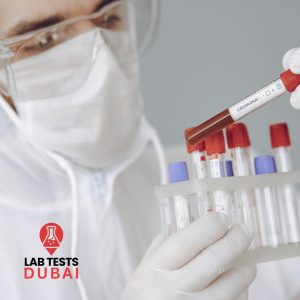
Anti-Transglutaminase IgA Test – Accurate Celiac Disease Detection
250,00 د.إ
Anti-Transglutaminase IgA is a highly sensitive and specific serological test for diagnosing celiac disease. It detects IgA antibodies against tissue transglutaminase (tTG), a key marker of gluten intolerance.
Sample Type : Serum
Methodology : Enzyme-immunoassay
TAT : 7 Days
Description
Anti-Transglutaminase, IgA Lab Test – Gold-Standard Screening for Celiac Disease
The Anti-Tissue Transglutaminase IgA (anti-tTG IgA) Test from Lab Tests Dubai is the most sensitive and specific blood test for screening celiac disease—a chronic autoimmune disorder triggered by gluten consumption.
When individuals with celiac disease eat gluten (found in wheat, barley, rye), the immune system attacks tissue transglutaminase (tTG), an enzyme in the small intestine, leading to villous atrophy, malabsorption, and systemic complications.
This test is essential for:
- Diagnosing celiac disease in symptomatic individuals
- Evaluating unexplained iron-deficiency anemia, osteoporosis, or diarrhea
- Screening high-risk groups (type 1 diabetes, Down syndrome, family history)
- Monitoring gluten-free diet compliance (antibody levels drop with dietary adherence)
Using enzyme immunoassay (EIA) technology, this serum-based test delivers accurate results within 7 days, helping gastroenterologists and family doctors confirm or rule out celiac disease—so patients can start life-saving treatment.
Available with home blood collection, Lab Tests Dubai ensures fast, accurate, and stress-free testing—so you can protect your gut health with confidence.
Why You Need This Test
If you’re struggling with chronic bloating, anemia, or unexplained fatigue, this test could reveal celiac disease—the autoimmune condition behind your symptoms.
You need the Anti-tTG IgA Test if:
- You have chronic diarrhea, constipation, or bloating
- You suffer from unexplained iron-deficiency anemia or low vitamin D/B12
- You experience fatigue, weight loss, or bone pain
- You have dermatitis herpetiformis (itchy, blistering skin rash)
- You have type 1 diabetes, thyroid disease, or a family history of celiac
- You’re being evaluated for osteoporosis or infertility
- You suspect gluten is making you sick
This test helps:
- Confirm celiac disease (positive in 90–95% of untreated cases)
- Avoid unnecessary endoscopy (if negative and low risk)
- Guide a strict gluten-free diet
- Prevent long-term complications
Early detection = healing of the gut and restored nutrient absorption.
Symptoms That Indicate This Test
Consider the Anti-tTG IgA Test if you experience:
✅ Classic Gastrointestinal Symptoms:
- Chronic diarrhea or constipation
- Abdominal pain, bloating, gas
- Nausea or vomiting after gluten
✅ Non-GI & Systemic Symptoms:
- Iron-deficiency anemia (not due to blood loss)
- Osteoporosis or frequent fractures
- Fatigue, brain fog, depression
- Joint pain or tingling in hands/feet (neuropathy)
✅ Dermatological:
- Dermatitis herpetiformis – intensely itchy, blistering rash (elbows, knees, buttocks)
✅ High-Risk Groups:
- Type 1 diabetes
- Autoimmune thyroiditis (Hashimoto’s)
- Family history of celiac disease
- Down syndrome or Turner syndrome
These signs may point to autoimmune gut damage—and this test helps start the diagnostic journey.
Natural Production: How tTG Antibodies Signal Celiac Disease
Tissue transglutaminase (tTG) is a normal enzyme found in the small intestine, involved in wound healing and tissue repair.
In celiac disease, when gluten (specifically gliadin) is consumed:
- Gliadin crosses the intestinal lining
- It’s deamidated by tTG
- The immune system sees the tTG-gliadin complex as foreign
- IgA antibodies are produced against tTG
- These antibodies attack the intestinal lining → villous atrophy
Why IgA?
- Most celiac patients produce IgA anti-tTG antibodies
- High levels correlate with disease severity
- Levels drop on a strict gluten-free diet
Important: A Total IgA test is often done alongside to rule out IgA deficiency (can cause false-negative tTG result).
What Happens If Untreated? Risks of Ignoring Celiac Disease
Ignoring celiac disease can lead to:
⚠️ Chronic Malnutrition – deficiencies in iron, calcium, B12, folate
⚠️ Osteoporosis & Fractures – from poor calcium absorption
⚠️ Infertility & Miscarriage – due to malabsorption and inflammation
⚠️ Neurological Issues – ataxia, neuropathy, migraines
⚠️ Increased Cancer Risk – enteropathy-associated T-cell lymphoma (EATL)
⚠️ Other Autoimmune Diseases – type 1 diabetes, thyroiditis
The good news? Celiac disease is 100% treatable with a strict, lifelong gluten-free diet—no medication required.
Early testing = full intestinal healing and normal life expectancy.
How to Prepare for the Test
To ensure accurate results:
✅ Continue eating gluten – at least 1-2 servings per day for 6–8 weeks before testing
❌ Do NOT go gluten-free before testing – can cause false-negative results
✅ No fasting required
✅ Inform your doctor of:
- Recent infections or steroid use
- History of IgA deficiency
- Current GI symptoms
A serum blood sample is collected via standard draw—available at our labs or via home collection.
Test Overview: Enzyme Immunoassay Method
Interpretation:
- <4 U/mL → Negative
- 4–10 U/mL → Weak positive (consider repeat or biopsy)
- >10 U/mL → Positive (high likelihood of celiac)
Note: Positive results should be confirmed with intestinal biopsy (gold standard).
Benefits of the Anti-tTG IgA Blood Test
🔹 Early Celiac Diagnosis
Detect disease before irreversible damage occurs.
🔹 Non-Invasive Screening
Avoid endoscopy if low risk and negative.
🔹 Monitor Dietary Compliance
Track antibody levels to ensure gluten-free adherence.
🔹 Family Risk Assessment
Screen first-degree relatives (10–20% risk).
🔹 Improve Long-Term Health
Prevent anemia, osteoporosis, and cancer.
If you’re tired of bloating, fatigue, or unexplained anemia, the Anti-Transglutaminase IgA Test gives you the answers you need in just 7 days.






Reviews
There are no reviews yet.